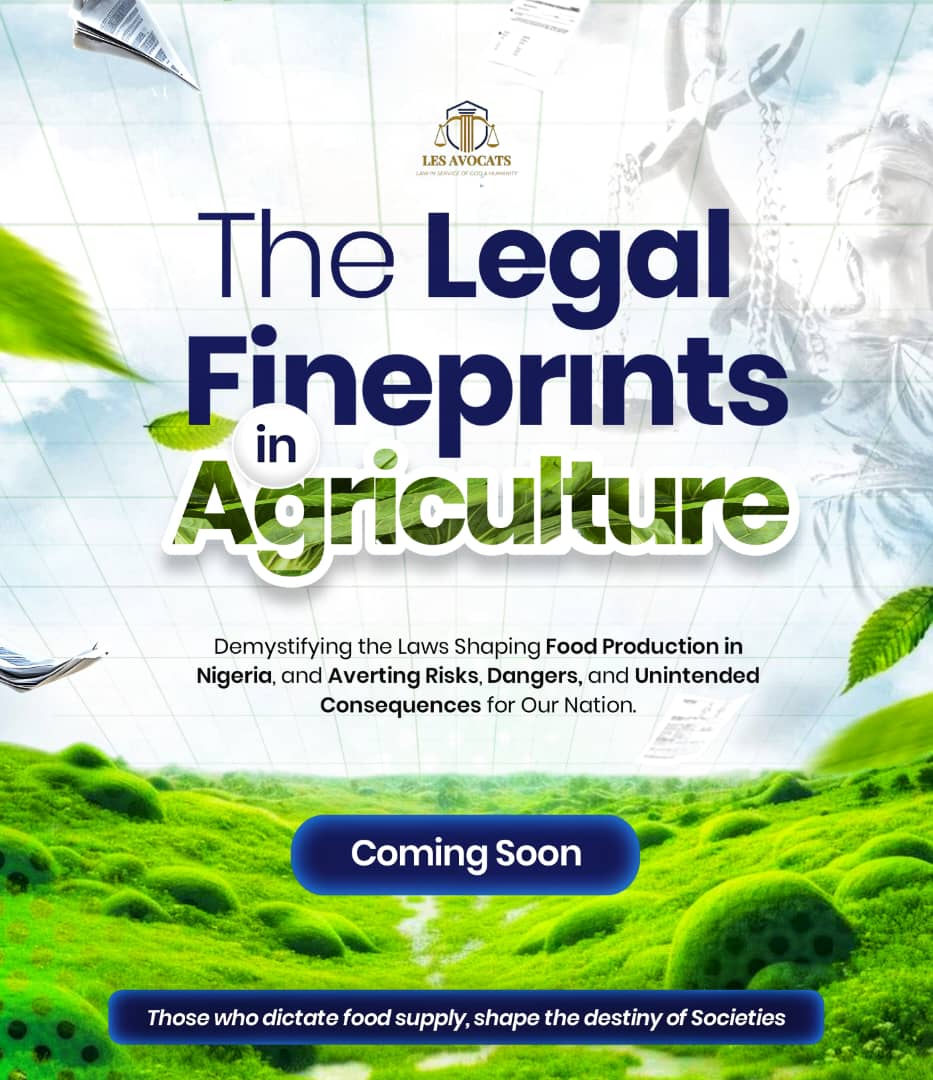The Legal Fineprints of Agriculture in Nigeria: Demystifying the GMO Agenda and the Looming Threat to Our Food Sovereignty

In the shadowy corners of Naija modern agricultural policy lies a threat so profound that it challenges not just our health, but our sovereignty, survival, and soul as a nation: Genetically Modified Organisms (GMOs). While nations around the world increasingly raise red flags over the consequences of genetically modified foods, The Bola Ahmed Tinubu’s government is sleepwalking into a bio-tech trap — cleverly laid by multinational pharmaceutical and agrochemical giants.
We are witnessing the coordinated commercial colonization of Nigeria's agriculture, masked under the promise of “food security” and “innovation.” But at what cost?
Agriculture in Nigeria is not merely an economic sector — it is a cultural heritage, a livelihood, and a constitutional right under Section 14(2)(b) of the Nigerian Constitution which guarantees the welfare of the people. The Biosafety Act 2015, enacted to regulate GMOs, has been used more as a legal smokescreen than a protective barrier. The National Biosafety Management Agency (NBMA), rather than upholding the principles of precaution, seems to have become a stamp pad for foreign biotech interests with the channels tv video saga of the Director covering up for Big Pharma.
International law is not silent. The Cartagena Protocol on Biosafety, to which Nigeria is a party, insists on the precautionary principle, demanding full risk assessments and the right of nations to refuse GMOs based on socio-economic, cultural, and ethical concerns. Yet, President Bola Ahmed Tinubu’s administration continues to import and approve GMO maize, cotton, and cowpea varieties — ignoring national calls for independent long-term studies on health of Nigerians and what this will cost our Food sovereignty.
Behind the scenes, an unsettling pattern emerges: the same global corporations pushing GMOs are closely tied to pharmaceutical interests, raising questions about a double profit motive — creating diseases and selling cures. Nigerian farmers, who for centuries have tilled the land with native seeds, are now being displaced, outpriced, and forced into dependency on patented seeds — seeds that cannot be replanted, and that rob the farmer of his autonomy.
If our farmers are reduced to mere licensees of foreign seed patents, we have lost our independence more than colonialism ever did.
Worse still, no one is asking why the same forces funding biotech expansion are also suspected in the destabilization of rural agricultural communities through herder-farmer conflicts. Could it be that the land is being violently cleared for the same companies now offering GMO as a “solution”? If so, this is economic warfare masquerading as policy.
O! Why must this two not let Nigeria be?
It is nothing short of a betrayal that the very heads of regulator agencies, tasked with safeguarding Nigerian lives, are instead certifying unproven, potentially harmful GMO products with alarming speed and questionable data.
When public servants and Nigeria X influencers cum doctors— under the guise of science — act as salesmen for multinational biotech giants, they ought not only to resign in honour, but to face investigations for endangering national security and public health.
The National Assembly, too, must be held accountable. With agricultural sovereignty at stake, the lack of debate, oversight, and awareness among lawmakers is staggering. Many appear either wilfully ignorant or comfortably compromised, ignoring mounting evidence of GMO-linked allergies, infertility, organ damage, and pesticide-resistant superweeds.
Even in the United States — once the global laboratory of biotech — voices like Robert F. Kennedy Jr., current WhiteHouse Secretary of Agriculture (in this scenario), have openly condemned GMOs as ecologically reckless and corporately motivated.
Kennedy has argued that GMOs have destroyed biodiversity, increased dependency on toxic pesticides like glyphosate, and caused unintended genetic consequences. His support for indigenous and regenerative farmingshould serve as a model for Africa, not the reverse.
If the country that birthed GMO technology is now having second thoughts, why should Nigeria blindly swallow the poison?
An SOS from an Avocat.
- Immediate Ban on New GMO Approvals pending independent investigations.
- Amendment of the Biosafety Act to require parliamentary approval, public referendum, and long-term health studies before any GMO approval.
- Criminal Liability for Regulatory Abuse: Officials who fast-track GMOs without public health review must be held legally accountable.
- Protection of Local Seed Systems: Indigenous farmers must be empowered through seed banks and protection of native crop varieties.
- National Agricultural Sovereignty Policy: Nigeria must declare food a national security asset and shield it from external capture.
We cannot eat sovereignty, but we cannot be sovereign without what we eat. Genetically modified organisms represent a Trojan horse — a promise of progress hiding a payload of dependency, disease, and dispossession.
Let this generation of lawmakers, farmers, and citizens not go down in history as the ones who stood by while Nigeria’s farms were auctioned to biotech cartels. Let us fight for the right to grow what we eat, eat what we grow, and preserve our land for generations unborn.
"The food you eat can either be the safest and most powerful form of medicine or the slowest form of poison."– Ann Wigmore

 Sinach
Sinach



